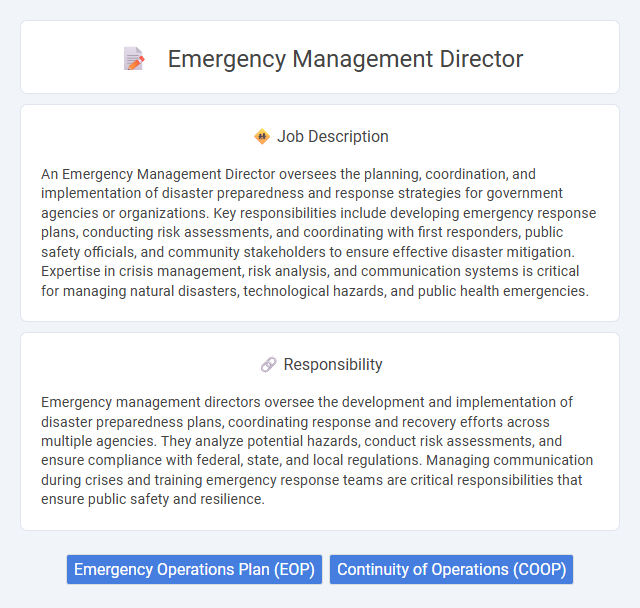
An Emergency Management Director oversees the planning, coordination, and implementation of disaster preparedness and response strategies for government agencies or organizations. Key responsibilities include developing emergency response plans, conducting risk assessments, and coordinating with first responders, public safety officials, and community stakeholders to ensure effective disaster mitigation. Expertise in crisis management, risk analysis, and communication systems is critical for managing natural disasters, technological hazards, and public health emergencies.
Individuals who remain calm under pressure, possess strong decision-making skills, and demonstrate resilience in high-stress situations are more likely to be suitable for an Emergency Management Director role. Those with the ability to communicate effectively, coordinate multiple teams, and adapt quickly to rapidly changing conditions probably fit well in this demanding position. Conversely, people prone to anxiety or difficulty managing crisis situations might find the role challenging and less compatible with their strengths.
Qualification
An Emergency Management Director typically holds a bachelor's degree in emergency management, public administration, or a related field, with many employers preferring candidates with a master's degree. Essential qualifications include extensive experience in risk assessment, disaster response planning, and crisis communication, alongside certifications such as Certified Emergency Manager (CEM) or FEMA Professional Development Series. Strong leadership, strategic planning skills, and knowledge of government regulations and emergency response protocols are critical for success in this role.
Responsibility
Emergency management directors oversee the development and implementation of disaster preparedness plans, coordinating response and recovery efforts across multiple agencies. They analyze potential hazards, conduct risk assessments, and ensure compliance with federal, state, and local regulations. Managing communication during crises and training emergency response teams are critical responsibilities that ensure public safety and resilience.
Benefit
An Emergency Management Director likely experiences significant benefits such as job stability due to the essential nature of disaster preparedness and response roles. Benefits may also include opportunities for professional growth in crisis management and public safety sectors. Compensation packages often feature comprehensive health benefits and retirement plans aligned with government or organizational standards.
Challenge
The Emergency Management Director likely faces the challenge of coordinating multiple agencies during high-pressure crises, requiring rapid decision-making and efficient resource allocation. Managing unpredictable disasters may demand continuous adaptation to evolving situations and communication with diverse stakeholders. Balancing preparedness planning with immediate response needs could present ongoing strategic and operational difficulties.
Career Advancement
Emergency management director roles offer significant opportunities for career advancement by developing expertise in disaster planning, crisis response, and risk assessment. Professionals in this field often progress to senior leadership positions within government agencies, nonprofit organizations, or private sector firms specializing in emergency preparedness. Advanced certifications such as Certified Emergency Manager (CEM) and experience in interagency coordination contribute to upward mobility and increased responsibility.
Key Terms
Emergency Operations Plan (EOP)
The Emergency Management Director develops and oversees the implementation of the Emergency Operations Plan (EOP) to coordinate response and recovery efforts during disasters. They ensure the EOP aligns with federal guidelines such as FEMA's National Response Framework and incorporates risk assessments, resource allocations, and communication protocols. Regular training exercises and interagency collaboration are conducted to maintain readiness and optimize emergency response effectiveness.
Continuity of Operations (COOP)
Emergency management directors are responsible for developing, implementing, and maintaining Continuity of Operations (COOP) plans to ensure critical government and organizational functions continue during and after a disaster or emergency. Their role includes coordinating with various agencies, assessing risks, and conducting regular training and exercises to enhance preparedness and resilience. Effective COOP strategies minimize downtime, protect vital assets, and ensure rapid recovery to support public safety and infrastructure stability.
 kuljobs.com
kuljobs.com